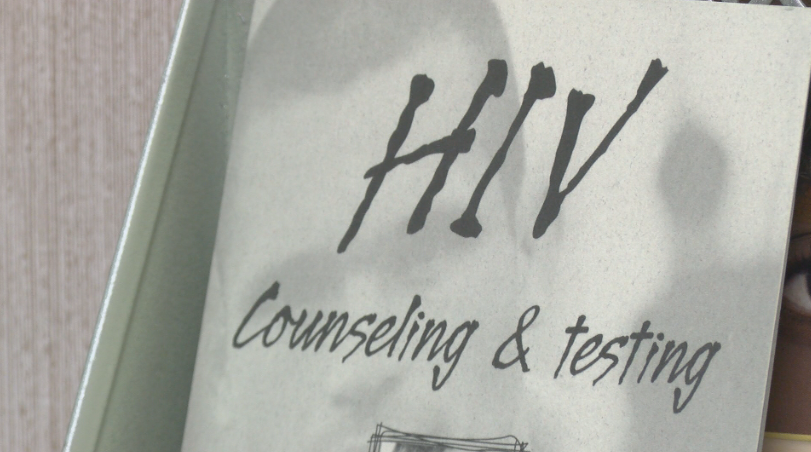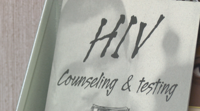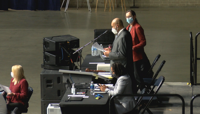SPRINGFIELD, Ill. � A on Gov. JB Pritzker’s desk could make Illinois the second state in the country to decriminalize HIV. Nearly 40 states have laws that make it a felony to have sex with someone without disclosing HIV status.
Illinois legislators tweaked the law in 2012, however most feel it’s past time to repeal the law completely. Prior to 2012, someone could face a Class 2 Felony charge even if they didn’t transmit the disease. Many feel the law increased harmful stigma around HIV and health care disparities.
“The laws across the country haven’t kept up with the science of HIV,� said Tom Hughes, Executive Director of the Illinois Public Health Association. “People who are on medication who are virally suppressed, they don’t pass HIV along anymore.�
This fight is personal for Hughes. He spent years working in the Illinois House while lawmakers tried to pass bills discriminating against people living with HIV. Hughes feels most of the reaction to the HIV epidemic in the 1980s was based on ignorance and fear.
“I’m really glad to have lived to see the progress that’s been made not only medically, but socially too,� Hughes said.

Tom Hughes, Executive Director of the Illinois Public Health Association
Oudated laws
Many advocates note the CDC now finds laws they pushed for in the �80s outdated and discouraged HIV testing. Mike Maginn is the IPHA’s HIV Prevention Director.
“Not a single study or peer-reviewed paper asserts HIV criminalization has actually reduced any HIV transmission in any jurisdiction where it exists,� Maginn said. “I look at this as a public health issue. It’s certainly not a crime.�
Maginn previously ran Central Illinois Friends based in Peoria. His successor, Deric Kimler, says everyone should understand that people living with HIV are not bad people.
Kimler noted that most people assume HIV only impacts the LGBT community. However, many straight people also live with the disease.
“But, a lot of LGBT individuals get arrested,� Kimler said. “Specifically LGBTQ individuals who are people of color get arrested wrongfully and charged trumped up charges with this.�
Many used HIV criminalization laws in court battles to convince people to plea out. Prosecutors would tell people they could drop all other charges if they agreed to the HIV charge. Advocates explained police departments and news organizations frequently publish mugshots informing the public someone went to jail for knowingly trying to transmit HIV, even if it’s not true.

Deric Kimler, Executive Director of Central Illinois Friends
Publicly outing them to everyone
“You’re hurting the person and their family and their circles � you’re outing them,� Kimler said. “You’re publicly outing them to everyone they’re around which could create an unsafe environment for them no matter what circle that is.�
Kimler’s organization is one of many across Illinois that provide free testing and resources for people living with HIV. Many advocates hope repealing this law can help people receive services they need to become undetectable for HIV while also increasing the number of people at risk using PrEP medication, or pre-exposure prophylaxis. PrEP is a daily pill that is 99.9% effective in preventing someone from receiving HIV.
Chris Wade coordinates the HIV Project for the Illinois Public Health Association. He stressed that the current law and stigma have to go.
“We’re setting up a system so that we don’t want people to go get tested because of fear and the retaliation that could come with that in knowing your status,� Wade said. “We already know about one in seven folks walk around and don’t know their status.�
Health care professionals and advocates hope to end the HIV epidemic by 2030. They say the bill on Pritzker’s desk is crucial to that goal.
“People don’t need to be contracting HIV anymore,� Kimler said. “The tools are here. But, this is essential to getting us to zero [transmission].�
Right side of history and humanity

Chris Wade, HIV Project Coordinator for the Illinois Public Health Association
Wade said the governor’s signature of approval during June could be a great celebration during Pride month. Still, he feels it would also be a way to honor the 40th anniversary of the first five reported cases of AIDS in the United States.
“I hope it does give people the comfort of knowing it’s okay to get tested. It’s okay to test positive,� Wade added. “You know it’s not a death sentence anymore.�
Hughes said the General Assembly came down on the right side of history by passing the bill to repeal the law this year. He also feels lawmakers are on the right side of humanity.
“I probably have lost 30 to 40 friends over the years to HIV,� Hughes said. “Many of those people were absolute heroes in the fight for medications, in the fight…really to exist.�
Wade is an openly-gay Black male living with HIV. He emphasized this repeal could be huge for his community.
“When we talk about criminalization laws, it’s the Black and brown folks that you see arrested and put out there in the media. This is an allegation. Nothing is proven yet,� Wade said. “It can destroy homes. It can destroy lives. There’s been too many instances in my lifetime where I’ve seen allegations made where no one actually contracted the virus.�
A “groundbreaking� decision
Each of the men noted there are cases where people willfully and intentionally transmit the disease. However, they stressed those situations are few and far between.
“It will be groundbreaking when the governor signs this,� Maginn said. “I think this is such a positive step for the state of Illinois, especially in this time when we’re taking about health equity.�
Several members in both chambers voted against the proposal to repeal the law. The plan passed on a 90-9 vote in the in April and a 37-17 vote in the last month.
“Unfortunately with the state of the political environment right now, politicians are looking at their constituents and wanting to, I guess, reflect what they feel. That sometimes blocks good health ideas,� Maginn added.
Hughes would also like to sit down and talk with lawmakers who voted against the bill to understand their rationale.
“Surely it’s not just because of your base. But what’s the rationale for it,� Hughes asked. “The original reason that the criminalization of HIV was done doesn’t exist anymore. So, I don’t understand unless you’re just unwilling to open your mind and listen.�
June 27 is National HIV Testing Day. You can find more information about testing and care services in Illinois at . More help is available by calling the HIV/STD hotline at 1-800-243-2437.





















